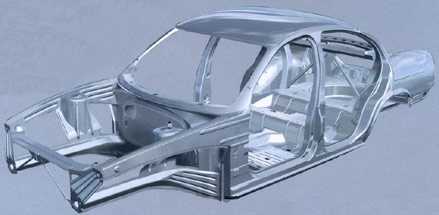 10-11-2008, 10:38 AM
10-11-2008, 10:38 AM
|
#31 (permalink)
|
|
EcoModding Apprentice
Join Date: May 2008
Location: N. Saskatchewan, CA
Posts: 1,805
Thanks: 91
Thanked 460 Times in 328 Posts
|
Things may have moved on a bit, but carbon fiber used to have a huge energy cost to produce. Aluminum costs much more to refine than steel, but carbon fiber was an order of magnitude worse. It is usually used as unidirectional cloth, to get the maximum benefit by aligning the fibers with the load and minimizing the resin content, which is dead weight to the overall structure. Spray-up is the lowest grade in fiberglass. If it is compacted with a vacuum bag, it gets better, but overall, roboticized precision fiber placement seems to be the way the industry is going.
Racing bicycles can carry ten times their own weight. My 1st car, a Morris Minor, was about 1,650 lbs, and my Metros are also well under a ton, but I'd rather have something that weighs less than the payload.
__________________
There is no excuse for a land vehicle to weigh more than its average payload.
|
|
|

|
 Today Today
|
|
|
|
 Other popular topics in this forum...
Other popular topics in this forum...
|
|
|
|
 10-11-2008, 04:39 PM
10-11-2008, 04:39 PM
|
#32 (permalink)
|
|
Master EcoModder
Join Date: May 2008
Location: Maynard, MA Eaarth
Posts: 7,908
Thanks: 3,475
Thanked 2,953 Times in 1,846 Posts
|
Hi Bob,
In the TED video, Amory Lovins says that the process uses a kind of digital "inkjet printer", then thermo-form it into whatever complex shapes you want. The auro body can have say only 14 parts instead of 100-150 parts; each one is formed using one cheap die set, instead of four expensive ones for stamping steel. The carbon parts can be lifted w/o a hoist, and snapped together, and you can lay color in the mold and get rid of the paint shop, as well. You end up with a process that is ~2/5 the "capital intensity" as the most efficient steel plant. And the plant doesn't need to be a large.
|
|
|

|
 10-12-2008, 12:44 AM
10-12-2008, 12:44 AM
|
#33 (permalink)
|
|
EcoModding Apprentice
Join Date: May 2008
Location: N. Saskatchewan, CA
Posts: 1,805
Thanks: 91
Thanked 460 Times in 328 Posts
|
OK, I've seen that one, and he makes some good points, but does not counter the ones i made. I made a velomobile frame, seat, and full suspension from six moldings, myself, and read trade magazines on composites, so I know the potential, as well as the problems. Sheet Molding Compound is replacing more metal every year.
Interestingly, the automotive industry has a slow and expensive way to adopt plastics, because they insist that everything must survive an old-style paint oven. You'd think that the resin formulators would get together and knock down the temperature needed for a quick bake of the finish.
__________________
There is no excuse for a land vehicle to weigh more than its average payload.
|
|
|

|
 10-12-2008, 07:54 AM
10-12-2008, 07:54 AM
|
#34 (permalink)
|
|
Master EcoModder
Join Date: May 2008
Location: Maynard, MA Eaarth
Posts: 7,908
Thanks: 3,475
Thanked 2,953 Times in 1,846 Posts
|
Hello,
Quote:
Originally Posted by TELVM

Even with traditional & cheap steel there could be a lot of room for improvement:
Ultra Light Steel Auto Body (ULSAB) Project
 The real problem is the vast majority of automakers and consumers couldn't care less about car weight reduction. As a matter of fact lots of people is convinced 'light cars are coffins' and 'heavy cars are safer', poor devils.
The real problem is the vast majority of automakers and consumers couldn't care less about car weight reduction. As a matter of fact lots of people is convinced 'light cars are coffins' and 'heavy cars are safer', poor devils.
In the inmortal words of Sir Colin Chapman: "Simplify, then add lightness" .
|
I'm glad you posted this -- it shows the potential of the material we use now. I notice that the strength of this lighter weight frame is almost 2X the standard methods -- and that would make it seem like it could be made even lighter?
I'll also throw out there that we should take the principle of "cradle to cradle" to our cars: can the materials be fully recycled, and not just "downcycled"? Because of paints, etc. the steel from cars must be used where lower purity steel can be used -- and then after that...?
William McDonough on cradle to cradle design | Video on TED.com |
|
|

|
 07-14-2013, 01:38 AM
07-14-2013, 01:38 AM
|
#35 (permalink)
|
|
It's all about Diesel
Join Date: Oct 2012
Location: Porto Alegre, Rio Grande do Sul, Brazil
Posts: 13,032
Thanks: 0
Thanked 1,720 Times in 1,534 Posts
|
Some vegetable fibers can be used to replace fiberglass as a reinforcement for plastic parts in general, and body panels, increasing the energy-savings in the overall manufacturing processes of a vehicle. And regarding traditional materials such as steel, their use can be more rationalized to use a lesser amount while still retaining a good safety.
|
|
|

|
|